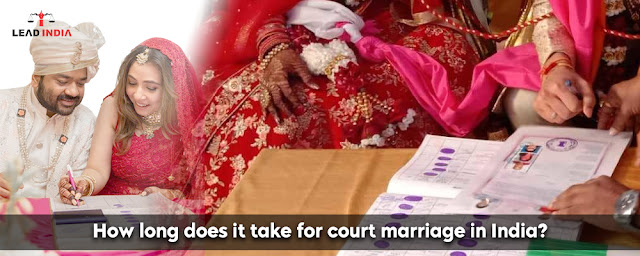How Long Does It Take For Court Marriage In India
Any Two Persons (Of Different Genders), Of Either The Same Or A Different Faith, May Wed Through A Judicial Marriage. Chapter Ii, Section 4 Of The Statute For Solemnizing A Judicial Marriage Lists The Following Requirements:
The Female Is 18 Years Of Age And The Male Is 21 Years Of Age; The Parties Are Not Permitted To Be Married To Living Spouses;
The Parties Must Be Of Sound Mind And Not Incapable Of Providing Legal Permission; And
The Parties Cannot Be Cohabiting.
The Parties Do Not Fit The Description Of Prohibited Links. With The Exception That A Marriage Between The Parties May Be Solemnized If A Tradition Dominating At Least One Of The Parties Permits It, Regardless Of Whether The Link Is Among Those That Are Prohibited.
How Long Does The Judicial Marriage Procedure Take To Complete?
The Entire Process, Starting With Providing Notice, Lasts A Maximum Of 60 Days. As Long As There Are No Complaints Voiced Within 30 Days Of The Notice's Publication.
In The Event That There Are Any Objections, The Marriage Officer Has A Maximum Of 30 Days To Undertake An Inquiry. If The Marriage Officer Upholds The Objection, The District Court Will Accept An Appeal Within 30 Days Of The Marriage Officer's Decision Date.
A Judicial Marriage Has The Advantages Of Being Quicker And Less Expensive. The Manner In Which The Marriage Is Celebrated Is Left Up To The Parties To The Contract. For Instance, Two Hindus Might Decide To Get Married In The Traditional Christian Manner. To Register Their Union, The Newlyweds Don't Need To File A Fresh Application To The Marriage Officer. It Represents A Stage In The Court Marriage Process. The Marriage Certificate That The Spouses Received As A Result Of Their Court Marriage Serves As The Only Official Document Proving The Parties' Union.
Conditions For Court Marriage:
The Marriage Officer Can Solemnize A Court Marriage Between The Bride And The Bridegroom Under The Act If The Following Conditions Are Fulfilled At The Time Of Marriage:
The Bride And The Bridegroom Do Not Have A Living Spouse
The Bride And The Bridegroom:
Is Not Incapable Of Giving Valid Consent To The Marriage Due To Unsoundness Of Mind
Though Capable Of Giving Valid Consent, Is Not Suffering From A Mental Disorder Of Such A Kind Or Such An Extent Which Makes Him/Her Unfit For Marriage And Procreation Of Children
Has Not Been Subject To Recurrent Attacks Of Insanity
The Bridegroom Has Completed 21 Years, And The Bride Has Completed 18 Years
The Bride And The Bridegroom Are Not Within The Degrees Of A Prohibited Relationship.
What Difficulties May One Expect From A Legal Union?
Contrary To Customary Weddings, Which Need Complex Religious Rites, Months Of Planning, And Traditional Rituals, Judicial Marriages Are Often Less Difficult. A Judicial Marriage Has A Few Drawbacks, Including The Following:
Depending On The Day That The Marriage Officer Allots For Everyone, The Dates For Appearance And Solemnization Of The Court Marriage Vary. Even In An Emergency, The Marriage Cannot Occur Before The Specified Time (30 Days From The Publication Of The Announcement, Assuming No One Objects).
A Justified Objection Might Cause The Marriage To Be Postponed For A Considerable Amount Of Time, And The Marriage Officer's Decision Is Final. In The Event That The Marriage Officer Upholds The Objection, The Parties Are Required To Appeal The Decision Before The District Court.
Most Locations Demand That The Full Procedure Be Done Physically By Visiting The Marriage Officer's Office Because There Aren't Always Functioning Internet Portals.
A Resident Must Have Lived In The Area For At Least 30 Days In Order To Be Eligible To Provide Notice To The Marriage Officer Of That Region Or District. In General, A Person Cannot Apply For Marriage Somewhere Other Than Where They Now Reside.
The Documentation Required, The Associated Charges, And The Individuals Appointed As Marriage Officers Differ By Location. Generally Speaking, It Abides By The Rules Set Out By The Several States.
If The Marriage Is Not Performed Within Three Months Of The Day The Notification Was Sent, The Notice Expires And A Fresh Notice Must Be Given To The Marriage Officer.
Getting Married In A Court Ceremony Might Be Difficult Legally If One Of The Parties Is A Member Of A Hindu Undivided Family And Is Either Hindu, Buddhist, Sikh, Or Jaina. This Is Because The Party Will Be Severed From Their Family. The Succession Would Be Governed By The Caste Disabilities Removal Act Of 1850.
If The Couples Live In Noida Then Court Marriage In Noida Can Be Done And Court Marriage Process Noida Should Be Followed. Court Marriage In Ahmedabad Can Also Be Performed If The Couple Live In Ahmedabad.
Lead India Offers Information, Legal Services, And Free Legal Advice Online To Solve The Issue. Talk To A Lawyer And Ask A Legal Question Will Provide The Finest Counsel In This Situation.
Source:-
Visit Us: — Www.Leadindia.Law
Call Us: +91–8800788535
Email: Care@Leadindia.Law
Youtube: — Https://Www.Youtube.Com/C/Leadindialawassociates
Facebook: — Https://Www.Facebook.Com/Leadindialaw
Linkedin: — Https://Www.Linkedin.Com/Company/76353439
Twitter: — Https://Twitter.Com/Leadindialaw
Pinterest: — Https://In.Pinterest.Com/Lawleadindia
Instagram: - Https://Www.Instagram.Com/Leadindialawofficial




Comments
Post a Comment